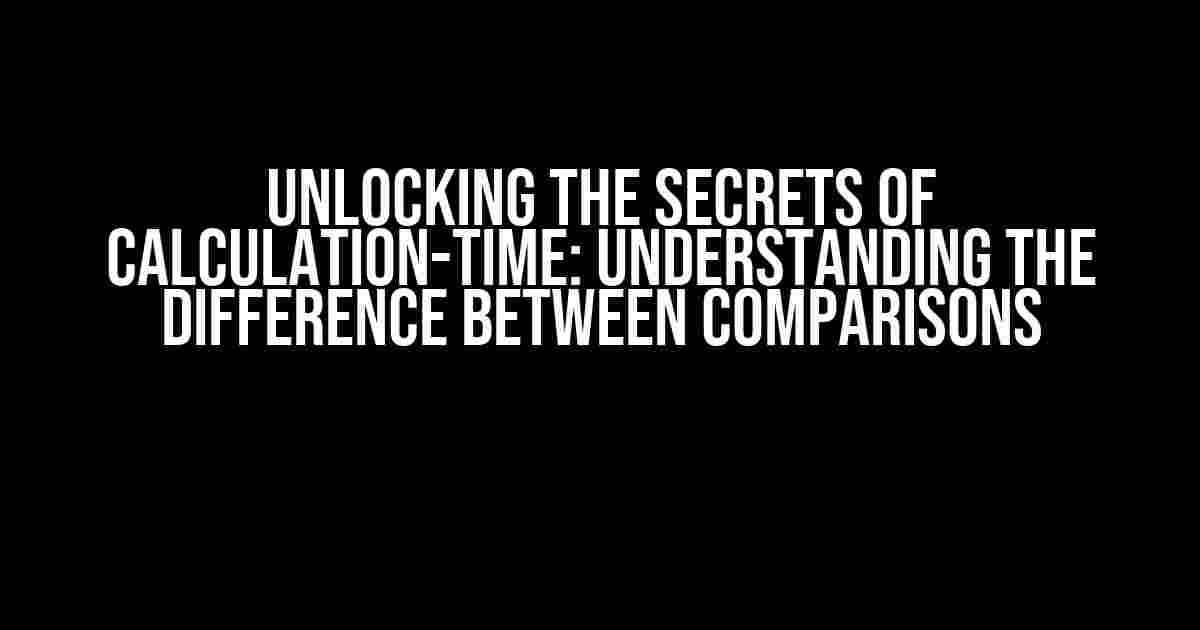When it comes to coding, one of the most critical aspects is understanding the calculation-time difference between comparisons. This fundamental concept can make or break the efficiency of your code, and yet, it’s often overlooked. In this article, we’ll delve into the world of comparisons, exploring the different types and their calculation-time implications. Buckle up, coders, and let’s dive in!
The Basics of Comparisons
Comparisons are the backbone of any programming language. They allow us to make decisions, manipulate data, and execute logic. But have you ever stopped to think about how these comparisons affect the performance of your code? Let’s break it down:
- Equality Comparison: Checks if two values are equal.
- Inequality Comparison: Checks if two values are not equal.
- Greater Than: Checks if one value is greater than another.
- Less Than: Checks if one value is less than another.
- Greater Than or Equal To: Checks if one value is greater than or equal to another.
- Less Than or Equal To: Checks if one value is less than or equal to another.
Categorizing Comparisons
Comparisons can be categorized into two main groups: Simple Comparisons and Complex Comparisons.
Simple Comparisons
Simple comparisons involve comparing two values using a single operator. These comparisons are typically fast and efficient, with a calculation-time of O(1).
if (x == 5) {
console.log("x is equal to 5");
}
Complex Comparisons
Complex comparisons involve comparing two values using multiple operators or functions. These comparisons are typically slower and less efficient, with a calculation-time that varies depending on the operation.
if (x > 5 && x < 10) {
console.log("x is between 5 and 10");
}
The Calculation-Time Difference
Now that we've covered the basics, let's dive into the calculation-time difference between comparisons. This is where things get interesting.
| Comparison Type | Calculation-Time |
|---|---|
| Equality Comparison | O(1) |
| Inequality Comparison | O(1) |
| Greater Than | O(1) |
| Less Than | O(1) |
| Greater Than or Equal To | O(1) |
| Less Than or Equal To | O(1) |
| Complex Comparisons (e.g., x > 5 && x < 10) | O(n) |
As you can see, simple comparisons have a calculation-time of O(1), which means they are extremely fast and efficient. However, complex comparisons have a calculation-time of O(n), which means they can be slower and less efficient, depending on the operation.
Optimizing Comparisons
Now that we've explored the calculation-time difference between comparisons, let's talk about optimization strategies.
- Simplify Complex Comparisons: Break down complex comparisons into simpler ones to reduce calculation-time.
- Use Early Exit: Use early exit statements to reduce the number of comparisons needed.
- Cache Frequently Compared Values: Cache frequently compared values to reduce the number of calculations.
- Avoid Unnecessary Comparisons: Avoid unnecessary comparisons by using conditional statements and logical operators.
Real-World Examples
Let's take a look at some real-world examples to illustrate the calculation-time difference between comparisons.
Example 1: Simple Equality Comparison
let x = 5;
if (x == 5) {
console.log("x is equal to 5");
}
In this example, the calculation-time is O(1), making it extremely fast and efficient.
Example 2: Complex Comparison
let x = 5;
if (x > 5 && x < 10) {
console.log("x is between 5 and 10");
}
In this example, the calculation-time is O(n), making it slower and less efficient.
Example 3: Optimized Comparison
let x = 5;
if (x >= 5 && x <= 10) {
console.log("x is between 5 and 10");
}
In this example, we've simplified the complex comparison, reducing the calculation-time to O(1).
Conclusion
In conclusion, understanding the calculation-time difference between comparisons is critical for writing efficient and optimized code. By categorizing comparisons, understanding the calculation-time implications, and employing optimization strategies, you can significantly improve the performance of your code. Remember, every millisecond counts, and a well-crafted comparison can make all the difference!
So, the next time you're writing a comparison, take a step back and think about the calculation-time implications. Your code (and your users) will thank you!
Frequently Asked Question
Get ready to crack the code of calculation-time difference between comparisons!
What is the main concept behind calculation-time difference between comparisons?
The main concept behind calculation-time difference between comparisons is to understand how different comparison operators (+, -, \*, /, etc.) affect the processing time of calculations. It's all about optimizing your code for faster execution!
Why does the calculation-time difference matter in programming?
The calculation-time difference matters because it can significantly impact the performance and efficiency of your program. Faster calculations mean faster execution, which can be crucial in real-time applications, data analysis, and other time-sensitive scenarios. Every millisecond counts!
How do different data types affect the calculation-time difference?
Different data types can significantly impact the calculation-time difference. For example, integer operations are typically faster than floating-point operations. Additionally, working with larger data types, such as long long int, can slow down calculations. It's essential to choose the right data type for your specific use case!
Can I optimize my code to reduce the calculation-time difference?
Absolutely! There are several techniques to optimize your code and reduce the calculation-time difference. These include using caching, parallel processing, loop unrolling, and minimizing unnecessary calculations. Additionally, using efficient algorithms and data structures can also make a significant impact. Get creative and optimize away!
What are some common pitfalls to avoid when dealing with calculation-time difference?
Some common pitfalls to avoid include overlooking the impact of data type conversions, neglecting to optimize loops, and ignoring the effects of cache misses. Additionally, premature optimization can lead to over-complicated code, so it's essential to strike a balance between performance and readability. Stay vigilant and avoid these common traps!

